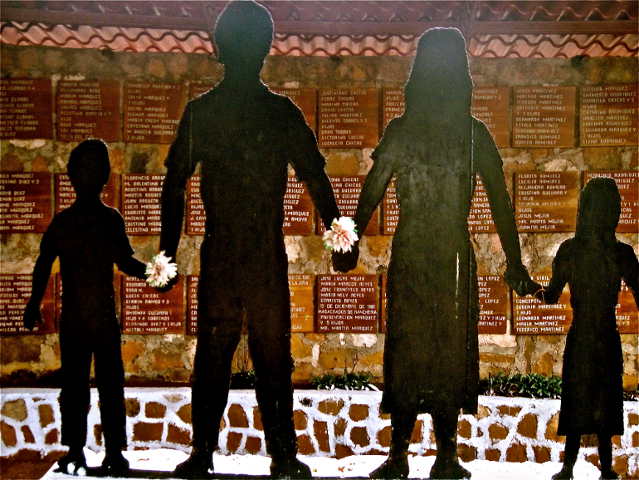
Markers for some of the dead at El Mozote, El Salavador, site of a 1981 massacre that saw more than a thousand unarmed civilians killed by soliders in this remote hamlet and surrounding hills.
Archbishop Jose Luis Escobar of San Salvador has abruptly closed the church’s legal aid office that was handling the most egregious massacre cases of the 1980s civil war.
Staff arrived for work as usual on the morning of Sept. 30 to find the locks changed on the doors and a contingent of armed private security guarding the rooms, located in a building that belongs to the Archdiocese.
A representative of the archbishop said the office no longer had a reason to exist, according to former director Ovidio Mauricio.
“We had no idea this was going to happen,” he said. “We do not know how we can continue to represent the victims as they have no resources and neither do we without Tutela Legal,” he said, using the Spanish name of the Archdiocesan legal aid office. Mauricio and other attorneys who have worked with survivors and victims’ families for decades now have no access to evidence in the cases, either.
Thirty El Salvadoran human rights groups, many with roots that reach back to the civil war, delivered a letter to Pope Francis at the residence of the Papal Nuncio in San Salvador Friday urging Tutela Legal be reopened, saying that the archbishop's decision "betrays the trust that victims placed in the Church."
Founded by Archbishop Oscar Romero to give legal assistance to poor El Salvadorans, the closure of Tutela Legal comes in the wake of a Supreme Court decision to consider vacating an “Amnesty Law” that has long protected perpetrators of war crimes. (See related story.)
Tutela Legal archives contain thousands of pages of photos, testimony and other evidence in cases that would go forward should the law be rescinded, including that of the assassination of Mons. Romero in 1980, and the 1989 murders of six Jesuit priests, their housekeeper and her daughter.
Military officials, the far right and Archbishop Escobar are against eliminating the “Amnesty Law.” The archbishop has called it “imperfect,” but suggested to local press it may be serving “to prevent the fall anew into a spiral of demands that cannot be fulfilled.”
Escobar’s predecessor, Archbishop Fernando Sáenz Lacalle, fired Tutela Legal counsel David Morales when Morales supported attention to Romero’s case before the International Commission of Human Rights in Washington D.C. In an interview shortly before Tutela Legal was shuttered, then-director Ovidio Mauricio said, “We have abandoned the case of Mons. Romero because of the hierarchy.”
Carlos Mauricio, a torture victim and human rights activist who was a plaintiff in one of the few successful cases against former El Salvadoran officers – in a U.S. court – recently examined hundreds of boxes of material at Tutela Legal, and said he found paper and photos “completely unprotected, some with fungus, deteriorating.” Among the files at the office, which has never been well funded, were undigitized photos taken at the scene of the Jesuits’ murders by Maria Julia Hernandez, who directed Tutela Legal for twenty-five years until her death in 2007. “I believe those kind of documents now will be destroyed or lost,” said Mauricio.
As international organizations registered disquiet, the archbishop’s office issued a terse communiqué saying it would protect records, and establish a temporary “ad hoc” commission to “liquidate the projects” of Tutela Legal and create a new entity.
Nevertheless David Morales, now the nation’s Human Rights Ombudsman, said the archdiocese must allow a review of the archives or he would seek legal recourse to obligate an inspection. Victims’ groups have said they will protest the closure of the office at the national cathedral on Sunday, and are organizing a letter to Pope Francis to register their concern.
“The victims say they feel they have been abandoned by the church,” said Sr. Anne Griffin of the Sacred Hearts of Jesus and Mary, who has accompanied massacre survivors in Morazan province for over a decade. Griffin met with victims within hours of the news the bishop had closed down the aid office in San Salvador, firing 12 staff members including their lawyers. Griffin delivered the attorneys’ message that they were personally committed to continue the most advanced of the El Salvadoran massacre cases, at El Mozote, in 1981.
[Mary Jo McConahay is the author of Maya Roads: One Woman's Journey Among the People of the Rainforest. She covered the wars in El Salvador and Guatemala for several publications.]



